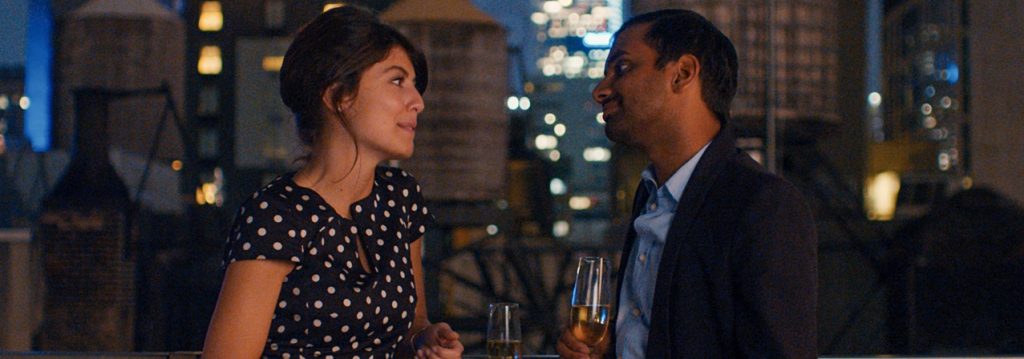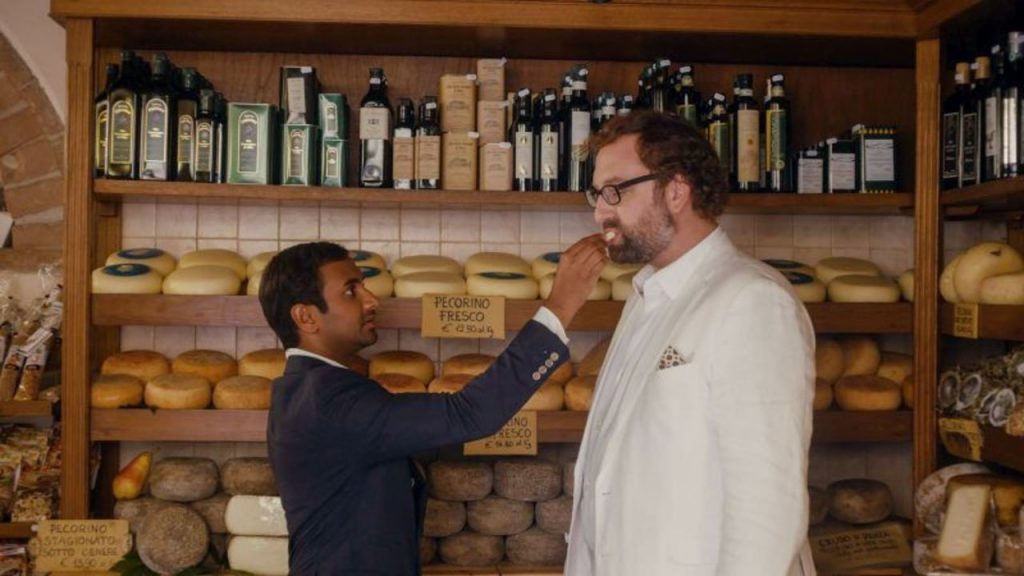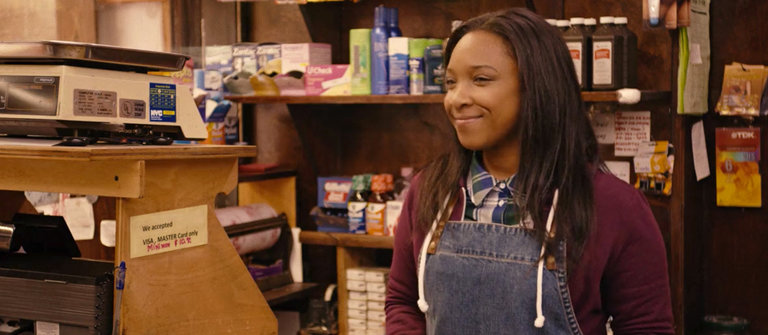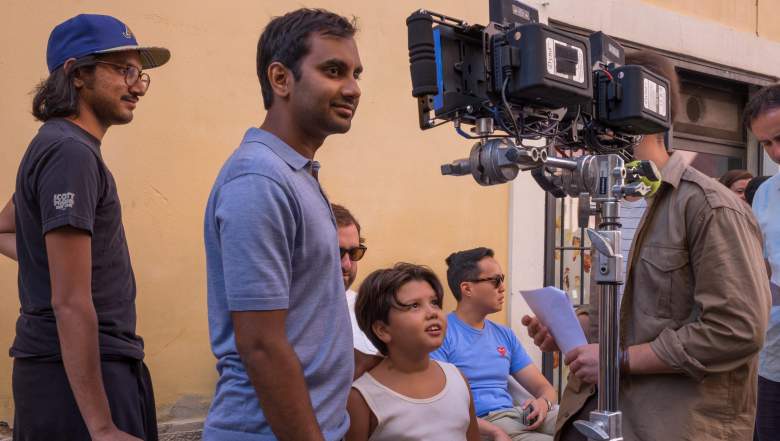Alex writes about the new season of Master of None.
On my way to my office this morning, the streetcar I had just exited passed through an intersection too slowly for those waiting to cross. The light had turned, and now the group of eastbound pedestrians I had joined were being blocked by the streetcar. We collectively began crossing the street, but were held up by the overlong public transit vehicle. As the car finally got close to giving us the space we needed to cross, the people around me began moving forward. As the car finally cleared the way, however, we discovered there was another group of people on the other side of it. Many around me were visibly surprised by this, and it was clear the same could be said of those on the opposite side. We all had to reconsider our paths across the street, because nobody anticipated further, human-shaped impedances. Everybody saw this roadblock from the perspective that was directly in front of them, without considering the others surrounding them, because that is what always happens.
When the first season of Master of None was released in late 2015, I fell in love with it immediately for reasons closely related to my appreciation for Aziz Ansari’s later standup specials. As Ansari aged, he had started to embrace giving entertaining lectures about technology and immigration, those lectures just so happened to also contain jokes and be delivered in Madison Square Garden. Master of None took a lot of those same talking points and injected them into a funny, well-shot and less-well-acted-but-still-fantastic sitcom. I watched the first season over a weekend, and then I watched it again over the following week. When the second season was released recently, I watched it as quickly as my work schedule would allow. It remains among my favourite television shows, next to the Unbreakable Kimmy Schmidt and Atlanta.
The most obvious things to talk about when looking at Master of None’s quality are self-evident: the characters are persistently thoughtful, woke folk who never feel like people telling you how woke they are (because their modern thoughts are always punctuated with tremendously funny jokes). The show is a sitcom about interesting, modern topics frequently told in an abstract sort of way; it has elements of a modern Seinfeld equivalent mixed with the storytelling freedom of Louie, all poured through Aziz Ansari’s personal filter. For obvious reasons, that results in an immensely positive final product.
So many people have discussed this show’s exceptional quality, and so many of the same points do not need to be reiterated by me. You can trust that I agree with the following: the storytelling in New York, I Love You is wonderful (especially as the narrative begins focusing on the deaf bodega employee), the filmmaking inspirations are wise ones for a comedy show, the Thanksgiving episode is perfect (as are the mirrored opening-ish and closing shots), and its persistently deep cut pop culture references always seem to work. That the second season premiere was both an extended homage to Italian neorealism and featured multiple Diane Lane jokes makes it truly a one of a kind show. All of these (and so many other) elements are obvious, so they don’t bear relisting. I prefer to talk about the things the show does poorly, because it helps reframe what it can do so well.
Like so many sitcoms before it, Master of None is often hilariously unrealistic. So few people have the freedom to move to Italy for three months to learn to make pasta, least of all while simultaneously paying rent on their apartment back in New York City. (The cheque for The Sickening cannot have possibly been big enough to cover this.) Nor do best friends happen to have a wedding to go to right in that three-month window, least of all a wedding of somebody they dated for eleven years (not to mention a bride who seems to be unaware her longtime ex was even coming to her wedding until he arrived). The convenience of Francesca and Pino’s temporary residence in New York is also ludicrous, but nothing compared to the career luck Dev has in spurning a seven-season television contract for a much more exciting new show that he came up with.
That said, I am willing to accept all of these things. If a sitcom were truly realistic, it would be boring; nobody wants to deal with the “how did the characters in Friends afford their apartments?” question ever again (not even wannabe writers who basically posed the same question in the paragraph above). Master of None is more modern than its sitcom predecessors, sure, but only because it was made later in the history of human civilization; Master of None and shows like Friends are still cut from the same well-tailored velvety cloth. What makes Master of None so good in spite of this is something that involves looking at the Friday Night Lights season two conundrum.
In season two of Friday Night Lights, a bizarre number of absolutely insane plot twists occur. Jason Street has a miracle baby, Buddy Garrity goes full Blindside with Santiago, and (of course) Landry kills somebody. Given that it is now about seven years since I saw this season, I’m sure I’m forgetting things, but the only truly important one is that, again, Landry kills somebody. The writers of the show would later disown the idea as soon as they could without getting fired, saying they were under network pressure to make the show more salacious in order for it to continue. Fine. But season two wasn’t as bad as people seemed to think: the broad strokes may have been painted with discount acrylics pulled out of a dumpster, but what saved the show was that the characters’ reactions to these insane ideas never felt unrealistic. They would consistently lose control over their actions, but their reactions to those actions felt proper. I maintain a belief that watching Landry’s grief for having killed a man (then covering it up, and then also bringing his policeman father into it) was interesting, despite the fact that it came from a plot rife with absurdity.
This defence was a bridge too far for most, including the show’s writers, which I understand. But it’s also what gets me through the silly elements of Master of None, so it seems worth mentioning here. Dev and company are in ludicrous situations, but their reactions in these situations feel real enough that it elevates the show beyond its silliness, and allows you to focus on the good stuff as opposed to the bad, or the bad that is supposed to appear as good.
The one element of the show that I find the most difficult to parse in both seasons is that I think a lot of these characters might be assholes, people who are frequently too self-involved to realize how insufferable they’re being. I mean, Dev and Arnold leave a wedding to go live their best lives and then come back to the wedding before Arnold grabs a microphone and gives an impromptu speech. This is not exactly the sign of a considerate person*.
*That ep-is-ode is not my fav-our-ite thing / that ep-is-ode is not my fav-our-ite THING!
I compared Master of None to Seinfeld earlier, the latter being a show where its two primary characters knew and seemed to be comfortable with being assholes*, but on Master of None it consistently feels like the people on the show do not understand how self-involved they are being. I would be incredibly curious to know Aziz Ansari and co-creator Alan Yang’s take on this, because I’m sure they have interesting thoughts about it, but as it stands I see Master of None as a show about a group of impulsive people who I could never stand to be around. Again, this does not make it a bad show (in fact it probably makes it better), but the fact that the show may or may not realize this raises questions about the lens I’m supposed to watch this show through. Am I supposed to see myself in Dev? Am I supposed to see his indecisiveness and think about my own life? Or am I supposed to reframe my own life because I see his actions and am frustrated by them?
*Kramer was too aloof to know or care, and Elaine’s inability to understand she was a bad person made her the most consistently interesting character of the four.
What makes Master of None good, and makes these questions worth asking, is precisely how I posed them above. Each one of my questions was me trying to figure out where I fit in this world, as opposed to looking at where others do. This show becomes a show about self-absorbed assholes because I am a self-absorbed asshole who makes it so. But what if it wasn’t?
There are two distinct threads that run throughout Master of None’s second season, interweaved over the course of the season until one takes over in the last couple of episodes. Like much of the first season’s focus on Dev and Rachel, we have the (potential) romance between Dev and Francesca mixed in with the show’s willingness to listen to others (think the Thanksgiving episode, or Brian listening to his dad talk about his dating life, or Dev trying to parse the differences between varying approaches to religion, or [most obviously] the entirety of New York, I Love You).
But the show chooses the side of the coin it views as the most important as the season closes: it cares much more about Dev and Francesca (most specifically Dev’s side of this equation) than it does about the show’s enjoyable commitment to the voices of the often unheard. While the finale does heavily involve Dev listening to Lisa talk about how Chef Jeff harassed her, this is not thread numero uno of the episode; it’s primarily a “will they or won’t they?” situation with Francesca*. Even that doesn’t show enough of both sides – throughout the season, Francesca seems limited as a character specifically because we almost never get to see her point of view. When we do get a scene of her and her fiancée Pino having a discussion about Francesca’s qualms about leaving America, it is far too little, far too late. It feels like a scene that was written on-set as Ansari and Yang were flipping through scripts and saying, “Oh shit, we almost never let Francesca speak for herself.” What might have seemed interesting in episode five seems like an overcorrection in episode nine or ten**. Master of None chooses to become a show about Dev learning about the world around him, but a Dev who always comes back to thinking about himself.
*Again, with the exception of casting minorities, this show is more similar to Friends than it is different.
**I am also willing to concede putting that scene in episode five might have created more problems than it would solve. I have no solution here, but that’s the joy of criticism; you never have to have the right answers, merely point out others’ wrong ones.
The main difference between season one and season two of Master of None boils down to the connecting thread throughout the episodes. To use a hacky comparison, season one feels more like a connection of singles being passed off as an album, while season two feels like a record with a cohesive thread running through it. In season one, there’s the thread of Dev and Rachel’s relationship, sure, but even that feels removed from the rest of the plotlines. In season two, Francesca and Dev’s friendship ends up encapsulating something that so many of the characters are going through independently.
That said, the final point of season one ends up setting in motion the core themes of season two. Dev, after breaking up with Rachel, decides he wants to move to Italy and learn how to make pasta. What makes this jarring shift interesting is that it shows him starting to enter the same mindset Rachel was as she moved to Japan: she started to ask “what if?” What if settling into a relationship with Dev isn’t right for her? What is she closing herself off from? Well, moving to Tokyo, for one, just like Dev would be missing out on moving to Italy. By breaking up, her and Dev are both able to cross off a “what if?” from their list, as they both do with their hilariously rom-comy and swift life changes.
This idea continues through the second season from a different, more depressing standpoint: what if one never made the choice to move to (this time a metaphorical) Italy? What did Dev miss out on with Rachel, and vice-versa? Throughout the season, we see an exploration of that idea, as Dev bounces back and forth between wondering whether or not he and Rachel should stay in contact. There’s also the brief ‘what if?’ contained in the opening episode – what if Dev’s phone was never stolen and he could stay in contact with Sara? – and Arnold’s in the second episode, as he wonders what his life would be like if he and Ellen never broke up. Dev’s career is quietly reflecting these things as well – anybody who knows the media landscape is aware that becoming known for hosting a show about cupcakes means you will almost certainly be the cupcake guy for the rest of your career.
The most obvious question posed by the second season comes in its final moments: after a couple of frank discussions with Dev, Francesca seems to be quietly contemplating the idea of leaving Pino. She is a woman who has spent her entire adult life with one man, and spending so much time with Dev seems to have introduced her to a world she never really got to experience. As she is about to leave the country, she sits on her couch and flips through her phone’s collections of memories of her and Dev, most notably a video of the pair in Washington Square Park. In this video, they are directly addressing the camera, speaking to “Future Dev” and “Future Francesca.” Past Dev and Past Francesca wish their future selves well, and it seems to lead Present Francesca to ponder her place in life. Then, Pino asks if she is ready to leave. Cut to a fade up on Dev’s snowy windows, a callback to the previous episode’s snowstorm. We see Francesca and Dev in bed together, with Dev sleeping and Francesca awake without an engagement ring on, turning to look at Dev. The scene cuts to black.
Now, I don’t think that final shot was a flashback, and Ansari has explicitly confirmed that suspicion since the episode’s release. Nor do I think Francesca leaves Pino for Dev, because that seems much too hacky for the very smart people behind Master of None. To these eyes, the moment plays as Francesca imagining herself with Dev and knowing that she would always wonder if leaving Pino was the right choice. As with every big decision in one’s life, there’s always a ‘what if?’ (as further emphasized by the moment late in the episode where Dev runs into Rachel, the human embodiment of a current ‘what if?’ in his life). The question evolves from a simple ‘what if?’ to wondering whether we can ever really get past questioning our own choices.
When I finished watching the finale of Master of None, I got up to fold some laundry. I put on a basketball podcast, and approximately three seconds later I paused that basketball podcast and sat back down to write the skeleton of what you’re currently finishing up. Eventually, I got back up and continued folding my laundry, because laundry doesn’t fold itself. I put the basketball podcast back on, and I listened to Zach Lowe and Doris Burke talk about Kawhi Leonard’s ankles. But I wasn’t thinking about what was in front of me as much as what had just passed me by, and I’m continuing to realize this shall always be the way it is.
When the slow-moving streetcar moved out of our way, I too was surprised by the people on the other side of it. I am (rather obviously) not immune to self-analysis bordering on temporary paralysis. Like most around me, I quickly began to navigate a slightly different path to accommodate those who had been revealed. I am willing to alter my path for others once they appear in front of me, but anticipating their needs remains beyond my capacity. There will always be another side to the streetcar, I know this, but actually embracing that idea is an entirely different challenge altogether.
Master of None’s core ideas are present in the name of the show: Dev is our so-called master, and his purview is “none.” He can do everything, make all the pasta he wants, see the world, but he will never be able to master anything so long as he continues trying to do everything. At its heart, Master of None is a show about a man who believes he can have everything slowly and continually learning that is an impossibility. There will always be something on the other side of your current barrier waiting to change your path. The truth is in the adjustment.







